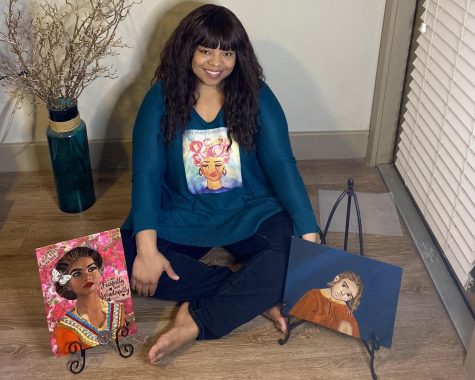‘It’s a spiritual transaction’: Summer Stallworth uses art to cope with her trauma
March 17, 2021

Editor’s Note: In continuation of Black History Month and to celebrate Women’s History Month, the Chronicle continues to feature diverse voices and highlight the achievements of talented artists.
Summer Stallworth sees her art as a form of devotion. She has to be in the right mindset to create, and with a brush in one hand and her mind on her religion, she takes to her canvas to make something intentional.
“Everything I do … is purposeful,” Stallworth said. “I cannot just paint for no reason. It won’t turn out right.”
A Detroit native now residing in Dallas, artist Stallworth created her first piece of art in November 2019 after suffering a great loss. Three months prior, her younger brother was murdered at the age of 23.
“He was a big piece of my heart,” Stallworth said. “I prayed, and I said, ‘God, you have to help me. What do I do?‘ … And I heard in my heart: ‘Pick up a brush and paint.’”
Stallworth’s first painting, “Like a Tree Planted,” features a tree planted in the ocean. The painting is a reference to the Bible verse Jeremiah 17:8, which is about a tree being planted along a riverbank, but Stallworth sees it as a reference to trusting God with her pain.
Praisy Abraham, a frequent customer of Stallworth, said her work references Bible scripture through its imagery and speaks to Christian customers like her.
Abraham purchased several clothing items featuring Stallworth’s paintings, including a white t-shirt with green sleeves and a painting of the Lion of Judah, along with a short sleeve t-shirt with a painting of a girl standing on water.
Recently, Stallworth has seen painting as more than a place of devotion—it is now a source of income.
Her passion for art became a business when the coronavirus pandemic interrupted her career as a behavioral therapist at Behavior Pioneers. When the pandemic made it impossible to be in person to perform her job, she turned to painting.
“I worked with my clients directly—then COVID hit,” Stallworth said. “That was taking what I had in my hands and giving it back to God.”
Stallworth officially launched her business, Broken Cocoon, in November 2020 as a way to spread a message of hope to her customers through her artwork, apparel and accessories.
Stallworth sells products ranging from artwork to casual and active wear that features her art on shirts and hats. The clothing is marketed toward women.
Stallworth sees her business as a spiritual metaphor for breaking out of pain. Although her art originated from a place of anguish, she sees this as her way of breaking out of her cocoon—just as she encourages her customers to do.
“I like that she empowers women, that’s one of the things she focuses on,” Abraham said.
One of Stallworth’s favorite paintings she has created, titled “I Still Believe,” came from a personal tragedy that happened in August 2020.
Stallworth was rushed to the emergency room and lost a fallopian tube due to an ectopic pregnancy that caused the tube to rupture.
Her doctor, she said, did not meet with her when she was prescribed medicine to cancel the ectopic pregnancy, where the embryo attaches outside the uterus, and did not follow up with her when her pregnancy hormone numbers grew dangerously high. She was not counseled about the danger of taking the dose she was prescribed and nearly died.
Stallworth had nine miscarriages in addition to the ectopic pregnancy, but she still hopes to one day have another child.
Stallworth said she feels like she is representing women everywhere through her art, but also that her art is vulnerable and shows that Black women should be allowed to not have to put on a brave face and be strong all the time.
“I’m looking for Broken Cocoon to evolve into a movement that celebrates one breaking out of whatever cocoon that’s keeping them from walking in their true self and true identity,” Stallworth said.







